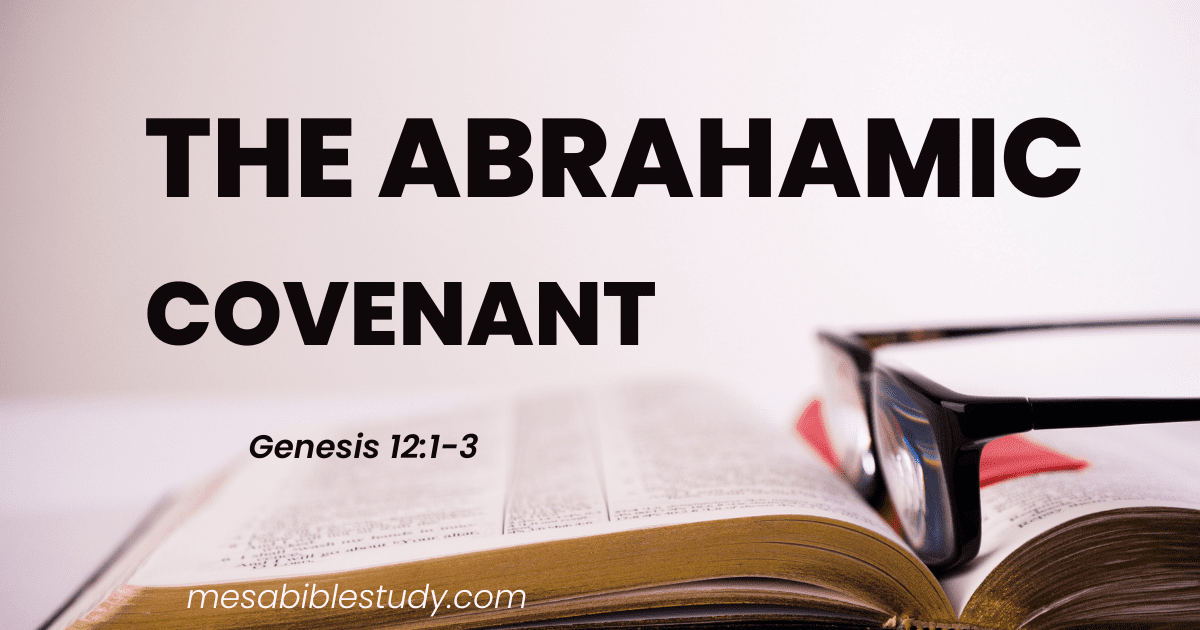The Abrahamic covenant is a significant promise that God made to Abraham in the book of Genesis. It includes promises of land, descendants, blessings, and everlasting protection and through this covenant would come the Savior of the world and is central to understanding God’s plan of salvation. The covenant was reaffirmed and expanded upon throughout Abraham’s life, and beyond; it is the central theme throughout the entire Bible.
‘Now the LORD had said unto Abram, Get thee out of thy country, and from thy kindred, and from thy father’s house, unto a land that I will shew thee: and I will make of thee a great nation, and I will bless thee, and make thy name great; and thou shalt be a blessing: and I will bless them that bless thee, and curse him that curseth thee: and in thee shall all families of the earth be blessed.’
Genesis 12:1-3
IMPORTANT! IMPORTANT! Please don’t gloss over this. The Abrahamic covenant is God’s promise to Abraham, not a mutual agreement between Abraham and God. God is making promises to Abraham and God will not break His promises to Abraham. Just like He will not break His promise to us in this age of grace that if we believe that Jesus Christ died, was buried, and raised from the dead three days later we are saved and will be with the Lord forever.
Understanding the Abrahamic covenant is crucial to understanding the Bible because it is a foundational part of God’s plan for salvation. It serves as the starting point for God’s relationship with His chosen people, the Jews, and through them, the world. The covenant is also seen as a precursor to the coming of Jesus Christ, who was a descendant of Abraham, and the fulfillment of the covenant’s promise of redemption for all people.
Overall, the Abrahamic covenant is a crucial element of the Bible that sets the stage for God’s plan of salvation, and it is an essential concept to understand for anyone seeking to understand God’s plan of salvation.
The promises God made to Abraham in the Abrahamic covenant are described in the book of Genesis, chapter 12, verses 1-3, and they include:
- Land: God promised to give Abraham and his descendants the land of Canaan as an everlasting possession.
- Descendants: God promised to make Abraham into a great nation and to bless him with numerous descendants.
- Blessings: God promised to bless Abraham and make his name great so that he would be a blessing to others.
- Protection: God promised to bless those who bless Abraham (the nation of Israel) and curse those who curse him.
- Redemption: God promised that through Abraham and his descendants (would come Jesus the Christ and), all the families of the earth would be blessed.
These promises were reaffirmed and expanded upon throughout Abraham’s life and are a foundational part of the biblical narrative. They are crucially important for understanding the relationship between God and the Jewish people, as well as the body of Christ, which is His Church. Next, you will see how the Abrahamic Covenant is a central theme throughout the Bible, and how God’s promises to Abraham are ultimately fulfilled in the person of Jesus Christ and the establishment of God’s eternal kingdom.
Below is a list of the places the Abrahamic Covenant is mentioned in the Bible, in a progression of time from Genesis to Revelation in chronological order:
Genesis 12:1-3: God calls Abram (later renamed Abraham) and makes several promises to him, including that God will make him into a great nation, bless him, and make his name great.
Genesis 12:7: God promises to give the land of Canaan to Abram and his descendants.
Genesis 13:14-17: God promises to give Abram’s descendants all the land he can see in every direction.
Genesis 15:1-21: God confirms His covenant with Abram and promises to give him many descendants, as numerous as the stars in the sky, and to give his descendants the land of Canaan. God also promises to bring Abram’s descendants out of slavery in a foreign land and to bless all nations through him.
Genesis 17:1-22: God establishes a covenant with Abraham and renames him, promising that he will become the father of many nations, that God will bless him and his descendants, and that they will possess the land of Canaan as an everlasting possession.
Genesis 22:15-18: God reaffirms His covenant with Abraham after he demonstrates his faith and obedience by offering his son Isaac as a sacrifice. God promises to bless Abraham’s descendants and to bless all nations through him.
Galatians 3:16: The Apostle Paul affirms that the promises made to Abraham and his seed were fulfilled in Jesus Christ.
Hebrews 6:13-20: The author of Hebrews describes how God’s covenant with Abraham serves as an anchor for our souls, providing us with hope and assurance.
Revelation 21:1-7: John the Apostle describes a vision of a new heaven and a new earth, where God dwells with His people and all things are made new. The promises made to Abraham are ultimately fulfilled in this vision of God’s eternal kingdom.
The bottom line is that it is impossible to understand the Bible, God’s plan of salvation without understanding the “Abrahamic Covenant”. To repeat, the Abrahamic covenant is God’s promise to Abraham, not a mutual agreement between Abraham and God. THIS IS GOD’S PROMISE TO ABRAHAM AND HIS DESCENDANTS, THE JEWISH PEOPLE, THE NATION OF ISRAEL. AND GOD WILL NEVER BREAK HIS PROMISES.

0 Comments